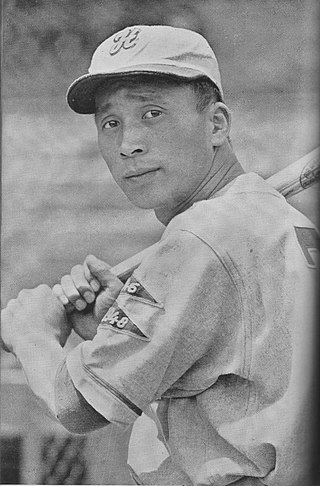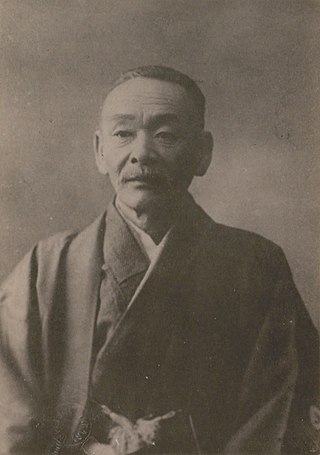Related Research Articles

Kanji are the logographic Chinese characters adapted from the Chinese script used in the writing of Japanese. They were made a major part of the Japanese writing system during the time of Old Japanese and are still used, along with the subsequently-derived syllabic scripts of hiragana and katakana. The characters have Japanese pronunciations; most have two, with one based on the Chinese sound. A few characters were invented in Japan by constructing character components derived from other Chinese characters. After the Meiji Restoration, Japan made its own efforts to simplify the characters, now known as shinjitai, by a process similar to China's simplification efforts, with the intention to increase literacy among the general public. Since the 1920s, the Japanese government has published character lists periodically to help direct the education of its citizenry through the myriad Chinese characters that exist. There are nearly 3,000 kanji used in Japanese names and in common communication.
Japanese names in modern times consist of a family name (surname) followed by a given name. Japanese names are usually written in kanji, where the pronunciation follows a special set of rules. Because parents when naming children, and foreigners when adopting a Japanese name, are able to choose which pronunciations they want for certain kanji, the same written form of a name may have multiple readings. In exceptional cases, this makes it impossible to determine the intended pronunciation of a name with certainty. Even so, most pronunciations chosen for names are common, making them easier to read. While any jōyō kanji and jinmeiyō kanji may be used as part of a name, names may be rejected if they are believed to fall outside what would be considered an acceptable name by measures of common sense.
Eiko is a feminine Japanese given name. Eikō, also spelled Eikou or Eikoh, is a masculine Japanese given name. The meanings of these names depend on the kanji used to write them.

Okinawan names today have only two components, the family names first and the given names last. Okinawan family names represent the distinct historical and cultural background of the islands which now comprise Okinawa Prefecture in Japan. Expatriates originally from Okinawa also have these names.
Masanori is a masculine Japanese given name.
Seiko is a Japanese given name, almost exclusively feminine. Its meaning depends on the kanji used to write it.
Tadamori is a Japanese surname and masculine given name.

Tomonori is a masculine Japanese given name.
Teiko is the common Roman alphabet spelling of two different Japanese given names, one feminine and one masculine; they are spelled differently in Japanese.

Tsunenori is a masculine Japanese given name.
Takaki is a Japanese surname. Notable people with the surname include:
Tatsunori is a masculine Japanese given name. Notable people with the name include:

Tokuji is a masculine Japanese given name.

Tokujirō is a masculine Japanese given name.

Tokurō is a masculine Japanese given name.

Toshinori is a masculine Japanese given name.
Arata is both a Japanese and Italian surname, and a masculine Japanese given name. As an Italian surname, it means "plow", while in Japanese, its meaning depends on the kanji used to write it.

Tokutarō is a masculine Japanese given name.
Yuumi is a Japanese feminine given name. It is distinct from the Japanese given name Yumi, which has a short "u".
Zenji is a masculine Japanese name.
References
- 1 2 Breen, Jim. "Japanese Names (ENAMDICT)". Electronic Dictionary Research and Development Group. Retrieved 11 May 2020.